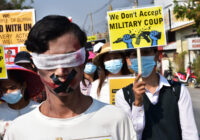The search for Flight MH370 has resulted in cooperation between countries locked in maritime disputes.
By Sukjoon Yoon
Since the mysterious disappearance of Malaysia Airlines MH370 on March 8, several countries have been participating in extensive Search and Rescue (SAR) and Humanitarian Assistance and Disaster Relief (HADR) operations in the South China Sea and beyond.
This provides a welcome contrast to the heated rhetoric of the past few years and may generate enough goodwill for the nations of the region to reconsider how they use their maritime security forces, paving the way for a fresh approach to the resolution of maritime conflicts and confrontations.
The Search for MH370
Prior to the MH370 issue, the regional media was preoccupied with the deployment of Chinese maritime security forces in disputed waters in the South China Sea, which tended to thwart rather than foster regional maritime peace and stability. For example, during the Chinese navy's largest-ever joint fleet exercise last November, a vessel escorting the refurbished aircraft carrier Liaoning was involved in a near collision with the Aegis cruiser USS Cowpens. Another example was the harassment of the USNS Impeccable by Chinese Maritime Surveillance vessels in international waters in July 2013.
Significantly, the missing Malaysian airliner has led to maritime security assets being engaged in SAR and HADR operations in waters with overlapping jurisdictional claims: there are disputes between Vietnam and Malaysia, and between China, Vietnam and Malaysia in the areas being searched.
Overcoming their reluctance to work together, these rival claimants have managed to set aside their quarrels, with the tragedy apparently facilitating genuine maritime cooperation amongst them.
The number of countries involved in the search and rescue operation has increased from 14 to 26 as of March 19, including Australia, China, Indonesia, Malaysia, the Philippines, Singapore, Thailand, the United States and Vietnam. The Chinese contingent comprises four naval vessels (including two large amphibious ships), four maritime patrol craft, six coastguard vessels and 14 rescue ships, with ten Chinese satellites also joining the search.
Arguments over territorial claims in the South China Sea have been put on hold, and instead there is bilateral and multilateral cooperation aimed at rescuing the victims and recovering the wreckage of the aircraft from waters that have been a major bone of contention between China and the Association of Southeast Asian Nations (ASEAN).
Role of Maritime Security Forces
This is an appropriate moment for the Asia Pacific region to take a fresh look at the role of its maritime security forces. They have undergone significant changes in recent years, with an expansion of inventories and improved capabilities, but their ultimate raison d’être has remained national defense.
The growth of non-military threats has, however, significantly broadened the function of maritime security forces. They are no longer concerned only with the protection of resources within their 200-mile Exclusive Economic Zones, but must also undertake law enforcement tasks to counter maritime terrorism, piracy and armed robbery, for which they must project force well beyond their territorial waters.
The protection of sea routes, which are vital economic lifelines, especially for energy supplies, is an essential aspect of this broader role, and the prevailing mistrust among the nations of the region has inevitably made such tasks more difficult and complex.
Unfortunately, in this climate of suspicion, there is an increasing risk of prolonged stand-offs between maritime forces giving rise to serious incidents. Even minor altercations can rapidly escalate into military conflict, because many regional security forces are now adopting proactive or even offensive postures.
This problem is aggravated by the close geographical proximity of potential adversaries, and constrained sea space in which their operations take place in disputed waters. Nevertheless, the established diplomatic and benign role of the maritime security forces in the furtherance of peace and stability has expanded considerably.
Improving Maritime Crisis Management
Maritime cooperation comprises more than just the use of maritime security forces. To maintain stability, a crisis management framework between disputing parties is essential to prevent miscalculations and misunderstandings escalating into serious incidents.
Perhaps the most sensitive issue demanding such cooperation concerns preserving the freedom of the skies over areas where maritime jurisdictional rights and interests are contested. Specifically, the dispute between China and Japan over the Diaoyu/Senkaku Islands in the East China Sea is particularly perilous.
The Chinese government has unilaterally declared an Air Defense Identification Zone (ADIZ), which includes coverage of these islands; and maritime patrol surveillance aircraft from these countries continue to monitor one another closely, with frequent dangerous interceptions.
Thus, the possibility of severe clashes, at sea or in the air above the South and East China seas, remains unacceptably high, and these risks can only be mitigated by improved maritime crisis management mechanisms like hotlines, policy channels and strategic dialogues.
Seen in this light, the disappearance of Flight MH370 offers an opportunity for various parties who are deeply mistrustful of one another to engage with potential opponents in a constructive manner.
For example, Chinese President Xi Jinping and US President Barack Obama have spoken by telephone to coordinate SAR and HADR operations between their maritime security forces and to avoid clashes in the disputed areas of the South China Sea.
To build upon this new spirit of cooperation, some helpful maritime crisis management measures may be identified:
- Enhance maritime security and confidence-building measures, without undermining national maritime rights and interests
- Make use of strategic dialogues and hotlines, and conduct exercises and operations only after giving prior information; establish protocols similar to the Incident at Sea (INCSEA) or the Code for Un-alerted Encounters Between Ships (CUES)
- Agree upon a common understanding of the law of the sea
- Encourage information sharing of "actionable intelligence" to facilitate maritime cooperation
Fresh Start for Maritime Security?
Although the disappearance of MH370 is undeniably tragic, something positive may come out of it. Regional maritime security forces are involved simultaneously in SAR and HADR operations, and the cooperation which this obliges presents a useful opportunity to build confidence, and thus to make unwanted maritime confrontations less likely in the future.
By allowing a fresh start, this tragedy should contribute to ensuring peace and good order at sea by helping to alleviate the widespread distrust which so bedevils the security of the Asia Pacific region.
*[Note: Captain (ROK Navy Ret.) Sukjoon Yoon is a Senior Research Fellow at the Korea Institute for Maritime Strategy and visiting professor with the Department of Defense Systems Engineering in Sejong University, Seoul. This article was originally published by RSIS.]
The views expressed in this article are the author's own and do not necessarily reflect Fair Observer’s editorial policy.
Image: Copyright © Shutterstock. All Rights Reserved
Support Fair Observer
We rely on your support for our independence, diversity and quality.
For more than 10 years, Fair Observer has been free, fair and independent. No billionaire owns us, no advertisers control us. We are a reader-supported nonprofit. Unlike many other publications, we keep our content free for readers regardless of where they live or whether they can afford to pay. We have no paywalls and no ads.
In the post-truth era of fake news, echo chambers and filter bubbles, we publish a plurality of perspectives from around the world. Anyone can publish with us, but everyone goes through a rigorous editorial process. So, you get fact-checked, well-reasoned content instead of noise.
We publish 2,500+ voices from 90+ countries. We also conduct education and training programs
on subjects ranging from digital media and journalism to writing and critical thinking. This
doesn’t come cheap. Servers, editors, trainers and web developers cost
money.
Please consider supporting us on a regular basis as a recurring donor or a
sustaining member.
Will you support FO’s journalism?
We rely on your support for our independence, diversity and quality.







Comment